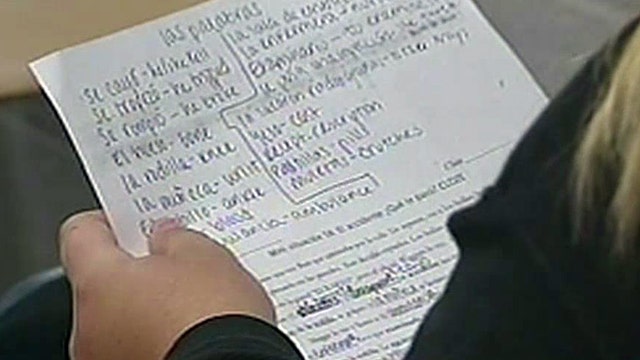Arizona teens must pass civics test to graduate
Rep. Steve Montenegro on why he introduced the legislation
Arizona will require high school students to pass a U.S. citizenship test on civics before graduation, becoming the first state in the nation to enact the law.
Both the state's House and Senate quickly passed legislation Thursday. Just the fourth day of the legislation session. Republican governor Doug Ducey signed it into law Thursday evening.
Arizona high school students must answer 60 out of 100 questions correctly on the civics portion of the test new citizens must pass.
The test is being pushed nationally by the Arizona-based Joe Foss Institute, which has set a goal of having all 50 states adopt it by 2017, the 230th anniversary of the U.S. Constitution. The institute says legislatures in 15 states are expected to consider it this year.
The Foss Institute, whose motto is "Patriotism Matters," has created a civics institute to promote the test to state legislatures as a way to increase the understanding of basic government by students, with the hope they will be better prepared to be engaged citizens.
Institute president Frank Riggs, a former California congressman who ran for Arizona governor as a Republican last year, said the testing initiative seeks "to ensure the delivery the very basics civics education that every high school graduate should have."
Former South Dakota governor Joe Foss won the Medal of Honor during World War II and died in 2003.
The North Dakota House overwhelmingly passed the same measure Thursday.
The Arizona law requires students to answer 60 of 100 questions correctly before they can earn a high school or GED diploma starting the 2016-17 school year.
Ducey had urged the Legislature to make the civics test the first bill to hit his desk as governor. He said studies show that students don't know enough about basic government to grow into effective citizens.
Former U.S. Supreme Court Justice Sandra Day O'Connor, an Arizona native, has supported the initiative. She's made civics education a prime focus in recent years.
Republican Arizona Senate Majority Leader Steve Yarbrough, sponsoring the bill in his chamber, said that "requiring that students pass this test is not by any means a silver bullet, but I think is a step, a small step forward."
"And I think we need to encourage the people of America to become more aware of the values of America," Yarbrough said.
Joe Thomas of Mesa, a high school government teacher, said he was concerned that having students take a 100-question test would take up an entire class period and will not be an effective way of getting students engaged in civics. He said the test is will require rote memorization rather than something that promotes critical thinking.
"The interest is promoting civics and we want to see students engaged," Thomas said. "I don't know if a test engages students."
The Associated Press contributed to this report










































